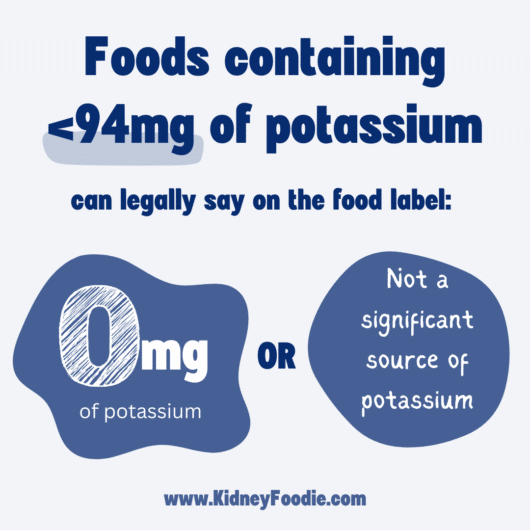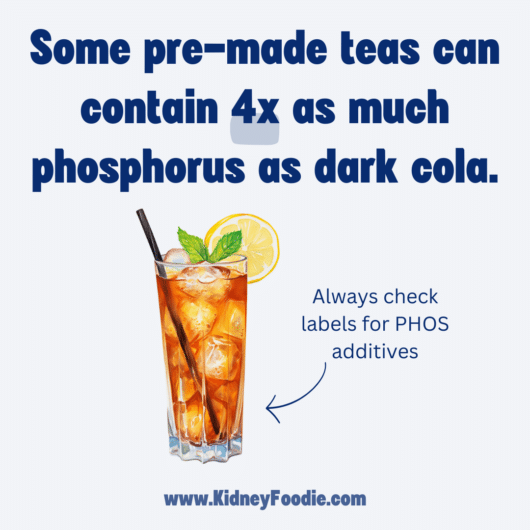Tea is one of the most popular beverages in the world and comes in many different forms. In moderation, tea can still be enjoyed when you have kidney disease; however, there are a few things to keep in mind when choosing the type of tea you drink.
This post may contain affiliate links through which we may earn a small commission to help keep this website free.
Skip the ads: Kidney Foodie Academy members can access ALL of the Kidney Foodie Grocery Shopping Guides ad-free by visiting this section of the library. Not a member? Learn more about Kidney Foodie Academy here.
Table of contents
Is tea ok for kidney disease?
Tea contains almost no protein, calories, phosphorus, or sodium. It does contain potassium and caffeine (typically). One cup of brewed tea has about 90 mg of potassium.
Many people with chronic kidney disease (CKD) do not need to restrict their potassium intake and wouldn’t need to limit tea for that reason. If you are on dialysis, however, you may need to be more mindful. People on hemodialysis often have to watch their potassium intake.
Drinking tea has been associated with a reduced risk of CKD and albuminuria and an increase in eGFR. Caffeine, a natural component in many teas, has a diuretic effect that may temporarily increase eGFR but can also raise blood pressure—so moderation is key.
However, excessive tea consumption can interfere with iron absorption due to tannins, natural compounds in tea that bind to iron. Drinking tea with every meal may increase your risk of iron deficiency anemia. Aim for no more than 1–2 cups per day, and avoid drinking tea with your most iron-rich meal.
Tea also contains oxalates, compounds that can contribute to kidney stone formation. Black tea is higher in oxalates than green tea. If you are prone to oxalate kidney stones, you may want to limit tea intake.
Can tea cause kidney disease?
There has been at least one case of kidney disease linked to tea, but the individual was consuming sixteen 8-ounce glasses per day. That is an extreme amount. Drinking 1–2 cups per day is generally considered safe and may even offer protective benefits.
What kind of tea is best for kidney disease?
Home-brewed tea is the best choice. Many pre-made or bottled teas contain phosphorus or potassium additives, which are best avoided by people with kidney disease.
Be cautious with specialty blends like brewable chai lattes or other milk containing teas, which are more likely to contain phosphorus additives.
Does tea have potassium?
Yes. Here are typical potassium levels:
- Green tea (1 cup): 8–45 mg
- Black tea (1 cup): 30–88 mg
Many people with CKD still have enough kidney function to handle a typical day’s worth of potassium, and a strict potassium restriction isn’t always necessary. In fact, there are several reasons potassium levels can get out of balance in kidney disease that have nothing to do with how much potassium you’re eating. Potassium restriction, when not necessary, can potentially do more harm than good. That’s why it’s important not to cut out high-potassium foods unless you’ve been specifically told to do so by your doctor or kidney dietitian.
If you want to learn more, sign up for our free mini-course on 5 Ways to Control Potassium Without Avoiding High Potassium Foods.
Why isn’t potassium listed on the food label for teas?
FDA regulations do not require manufacturers to list potassium unless it contributes more than 2% of the daily value (94 mg out of 4,700 mg). So a single serving of tea may legally be listed as containing zero potassium, even if it contains up to 90 mg.

For people with CKD, this can be misleading. For example, drinking three 14-ounce glasses of tea (42 oz total) could add up to over 450 mg of potassium.
How much potassium is in tea?
Fortunately, we do have some information available about potassium in tea. Here is USDA data on potassium and phosphorus in various teas (per 8 oz unless noted):
Potassium additives in tea
Some low-calorie and diet teas contain potassium additives, such as acesulfame potassium. Always read labels carefully.

Does tea have phosphorus?
Most brewed teas contain very little phosphorus (0–2 mg per cup). However, some ready-to-drink teas contain much more due to additives. For example, some ready to drink Green Citrus Diet tea contains 85 mg per 8 oz—nearly four times as much phosphorus as a dark cola.

Phosphorus additives are commonly found in bottled teas. These additives are highly absorbable and can significantly increase your phosphorus load.
Check the ingredient list for any word containing “phos” (e.g., monopotassium phosphate, phosphoric acid) to spot phosphorus additives.

Pre-made Teas with No Phosphorus Additives
These brands had no phosphorus additives in any products listed in the USDA FoodData Central database (Oct 2022). Always check labels, but these are generally safer picks:
- 365 Everyday Value
- 4C
- 7 Select
- 8th Wonder
- Ahold
- Archer Farms
- Bai
- Bare Nature
- Bhakti
- Bigelow
- Blue Buddha
- Brooklyn Crafted
- Bruce Tea
- Cheribundi
- Circle K
- Corner Store
- Diet Snapple
- Doc’s Tea
- Fresh & Easy
- Fresh Foods Market
- Gaiam
- Gefen
- Goldenbrew
- Gratitude
- Harris Teeter
- Hawaiian Sun
- Honest
- Honest Tea
- Hubert’s
- Inko’s
- Ito En
- Joe Tea
- Joyba
- Kabaki
- Kings
- Kroger
- Long Island
- Lowes Foods
- Market District
- Marketside
- Meijer
- Milo’s
- Nature’s Promise
- Organics
- Ocean Spray
- Peace Tea
- Prairie Farms
- Publix
- Publix Deli
- Pure Leaf
- Raley’s
- Rama
- Red Diamond
- Ritchey’s
- Runningbyrd Tea Company
- Say When
- Shaka
- ShopRite
- Shurfine
- Sotea
- Sparkling Ice
- Sweet Leaf
- Tazo
- Teariot
- Teas’ Tea
- Teavana
- Tejava
- Texas Tea
- That’s Smart!
- The Republic of Tea
- Third Street
- Tiesta Tea
- Tops
- Vibe
- Wegmans
- Wild Harvest
- Zevia
- Zone 8
Pre-Made Teas to AVOID
These brands typically contain phosphorus additives and should be avoided (as of the October 2022 USDA FoodData Central Database):
- Brisk
- Food Lion
- Fuze
- Gold Peak Tea
- H-E-B
- Lipton
- Nestea
- PICS
- Smart Sense
- Tampico
- Titan Tea
Pre-made Teas that may contain additives
Some brands have both kidney-friendly and non-kidney-friendly options. Check each label:
- Argo Tea
- Arizona
- Clover Valley
- Essential Everyday
- Food Club
- Gold Peak
- Great Value
- Hy-Vee
- Kum & Go
- Langers
- Luzianne
- Pacific Coast Selections
- Readyleaf
- Rutter’s
- Schnucks
- Signature Select
- Snapple
- SSIPS
- Steaz
- Sunny Select
- Swiss Premium
- Tradewinds
- Turkey Hill
- Weis
- Wellsley Farms
Is Lipton Tea Good for Your Kidneys?
It depends on the type.
Pre-brewed Lipton teas—the kind you buy in bottles—often contain phosphorus additives, which should be avoided if you have kidney disease. These additives are a highly absorbable form of phosphorus, meaning they can significantly increase your phosphorus levels and contribute to complications like bone disease and vascular calcification. If you see ingredients like phosphoric acid or anything with “phos” on the label, that’s a sign to skip it.
Lipton tea bags, on the other hand, do not contain added phosphorus or potassium and are generally considered safe for people with kidney disease when consumed in moderation. Just keep in mind that all tea contains compounds like tannins and oxalates, which—when consumed in excess—can interfere with iron absorption and increase the risk of iron deficiency anemia or osteoporosis over time.
As a general guideline, it’s best to stick to no more than 1–2 cups per day and avoid drinking tea with your most iron-rich meal.
